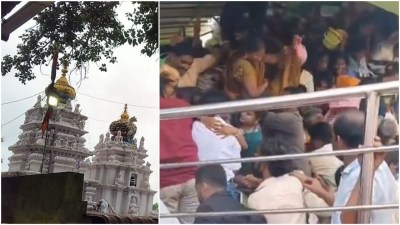For doctors at Indian Army’s Turkey hospital: Long hours, turns for shut-eye & a thank-you note
The team of 13 doctors, paramedics, and other staff are at Iskenderun as part of Operation Dost, a mission to provide medical assistance and treatment to earthquake-affected victims.
 The army field hospital in Iskenderun, Hatay, Türkiye has started functioning with running Medical, Surgical & Emergency Wards; X-Ray Lab & Medical Store. ANI Photo 090223
The army field hospital in Iskenderun, Hatay, Türkiye has started functioning with running Medical, Surgical & Emergency Wards; X-Ray Lab & Medical Store. ANI Photo 090223 Traffic jams, water-filled underpasses, hills of concrete and rubble, buildings with deep cracks and people rendered homeless in sub-zero temperatures – the images of devastation filed past as the Indian Army’s 99-member medical team undertook an arduous five-hour drive to the quake-hit city of Iskenderun, in southern Turkey’s Hatay province, minutes after they landed in the country.
After an eight-hour-long flight from India, the Army’s 60 Para Field Hospital unit had landed in Turkey in two separate batches on Tuesday, just hours after a massive earthquake struck Turkey and killed nearly 19,000 people and injured thousands. The team had almost immediately set off for Iskenderun.
At Iskenderun, the job at hand was urgent: to find a building without cracks. Speaking to The Sunday Express from Iskenderun, Lt. Col. Yaduvir Singh, commanding officer of the 60 Para Field Hospital, said, “We found a steady school building without cracks close to a hospital. It took us nearly five hours to set up the hospital. By evening, we were ready to see patients.”
The team of 13 doctors, paramedics, and other staff are at Iskenderun as part of Operation Dost, a mission to provide medical assistance and treatment to earthquake-affected victims.
Over the next three days since the hospital was set up, patients – ranging from infants to senior citizens with varying degrees of trauma and injuries – would start pouring into the 30-bed hospital at Iskenderun.
“On the first day, there were about 10 patients, but the numbers started going up within the next two days. So far (Saturday morning), we have treated around 600 patients,” Lt. Col. Singh said.
While most were trauma cases, some were particularly challenging, the officer said. “We treated a five-year-old girl who was buried under the rubble for three days. Then there was a 48-year-old man whose leg was crushed under the debris. We had to amputate his leg,” the officer said.
With the collapse of the local medical infrastructure, many patients with chronic ailments are also flocking to the Army hospital.
“There is a big hospital at a distance of about 300 metres from our location, but it was damaged in the earthquake. While their OPD is still functioning, the OT is not. So many patients are reaching out to us from there,” Lt. Col. Singh said.
Major Beena Tiwari is the only woman medical officer in the team of 99, but has hardly felt out of place. “Yes, women do need some privacy, but then you find a way. More than my comfort, the job now is to make the patients feel comfortable,” she said.
Major Tiwari, a paratrooper who joined the elite 60 Para Field Hospital only last month, is the face of a heartwarming viral photo – of her being hugged by a Turkish woman.
Hailing from an Army family – her father served in the Kumaon regiment – she joined the Army over four years ago and served in a military hospital in Assam’s Dinjan. “I couldn’t have joined any other profession. Since my probation, I have been eagerly waiting to join the 60 Para Field Hospital,” she said.
For the last three days, the team, though sleep deprived and tired, has hardly taken a break. They have been staying at the same school and take turns to tuck into their sleeping bags for a quick break.
On the “biggest challenge” for the team of trained paratroopers and hardened soldiers, the officer said, “The weather, I would say, is the biggest challenge—both for us and the population there. The temperature was around minus 2 degrees Celsius but the wind chill factor made it appear colder. What made this worse was the lack of electricity initially, though we had carried a generator with us. We have now managed to get power supply… and packaged water is available for everyone.”
The warmth of the local population made up for the chill, the officer said. “We got two volunteers who are helping us as interpreters too. We are also getting support in terms of supplies from the hospital next door, and will soon get a local pediatrician.”
The officer said that while the team had brought medical supplies enough for nearly 2,100 patients, if needed, “we can always seek replenishment and reach out to the embassy and the Ambassador”.
Asked what keeps them going through such long hours with little sleep and extreme working conditions, Lt. Col. Singh said the response of the local population was a major boost.
“A young man who saw us working and performing all the set evacuation drills told me that he would always remember our country. Another doctor from the hospital nearby wondered why all their patients chose us over them. It was a mixed feeling. We were embarrassed and happy. Such words keep us going.”
60 Para Field Hospital has in the past responded with swiftness during other international disasters too, including during the 2004 tsunami in Indonesia. The decorated unit had also played a critical role during the Korean war from 1950-53. The unit then was commanded by Lt Col A G Rangaraj, who received the Maha Vir Chakra for his efforts.
On Saturday, another IAF C-17 aircraft carrying earthquake relief material and equipment left for Syria’s Damascus. After offloading relief material there, it will fly on to Adana in Turkey.



- 01
- 02
- 03
- 04
- 05



























